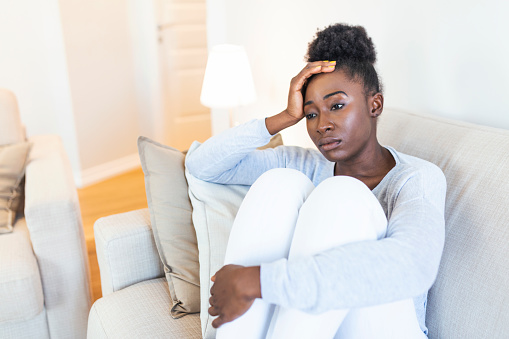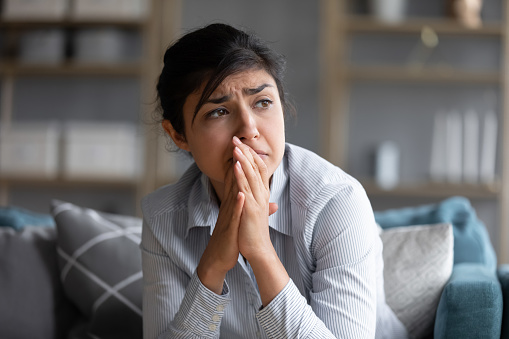
Can Anxiety Raise your BP (blood pressure) or cause hypertension? When we experience stress, our bodies respond by pumping out more adrenaline and cortisol. These chemicals help us cope with threatening situations and make us more alert. However, when stress levels are high for prolonged periods, it can have negative health consequences, such as weight gain and heart disease
In some people, persistent stress leads to high levels of anxiety, also known as stress-related disorders.
A 2017 review found that psychosocial stress (stress and anxiety) can have a negative impact on your blood pressure. However, the review did not find any evidence that anxiety per se raises your blood pressure. So, while high anxiety may make it more difficult to maintain healthy blood pressure, it doesn’t have any direct link to the number on the scale. Instead, it’s a combination of other factors that lead to high blood pressure.
Contents
What is anxiety?
Anxiety is a feeling of worry, nervousness, or uneasiness. It’s your body’s way of responding to stress—a natural response that can sometimes be an issue. Anxiety can have benefits and disadvantages depending on the triggers or cause, frequency, and magnitude of the attacks.
In the medical world, the term for frequent and overwhelming anxiety attacks is generalized anxiety disorder (GAD). However, there are other anxiety disorders that affect different people including separation anxiety, social anxiety, agoraphobia, and specific phobias among others.
GAD is when you have constant and overwhelming feelings of worry about things in your life. You might notice that your heart rate speeds up or your muscles tighten up when you’re feeling anxious.
How does anxiety affect blood pressure?
As we’ve covered, high levels of stress and anxiety can increase blood pressure in the short term. However, it’s important to note that this is only in certain people and in some circumstances.
If you have a healthy body weight, normal blood pressure, and eat a healthy diet, stress and anxiety can’t raise your long-term blood pressure. This is why anxiety is also known as the “worried well” syndrome.
With constant worries, however, there are several cardiovascular effects that you can experience. It can relevant the blood pressure in the short term and also affect the muscles of the heart among other body systems.
How much does anxiety raise BP?

Anxiety can raise blood pressure by 10 points. That might not sound like much, but it’s significant enough to make a difference. When your systolic blood pressure is 140 and your diastolic blood pressure is 90, a 10-point increase on both would put you at 150/100. If that continues unchecked, your heart and other organs might not be able to function properly.
In one study, participants with a generalized anxiety disorder (GAD) had higher BP than people who did not have the disorder. However, the study also found that participants with GAD were more likely to use drugs to control their BP.
This may have led to a false-positive result. In another study, individuals with high levels of anxiety had increased systolic blood pressure but not diastolic blood pressure. This suggests that high levels of anxiety elevate your heart rate but don’t affect your overall blood pressure.
Can anxiety cause high diastolic blood pressure?
Yes, anxiety can cause high diastolic blood pressure (DBP). This occurs when your heart rate is increased during stress but your overall blood pressure stays normal. However, it does not occur to everyone but anxiety may elevate diastolic blood pressure in some people.
In most people, anxiety will not cause a long-term increase in blood pressure. However, it can lead to dramatic, temporary spikes in blood pressure when one has a panic attack or anxiety episode which feels like you are about to die.
Other things that can cause an elevation of diastolic blood pressure include taking a high-sodium diet, obesity, alcohol consumption, and stress. Thus, there are a number of factors that can contribute to elevated blood pressure, including stress and anxiety. People often associate high diastolic blood pressure with older people and think it’s normal as they age.
However, this isn’t always true. Some people have high anxiety levels which may be causing their elevated diastolic blood pressure. This type of high blood pressure is called “white coat hypertension.”
It’s not serious, but if you don’t address the underlying causes for the anxiety, your white coat hypertension may worsen or turn into chronic high blood pressure. If you do not manage your stress and anxiety, it can lead to other health problems like diabetes, heart disease, and depression.
What can cause anxiety and stress to affect BP?
Many factors can contribute to a person’s stress levels. An individual’s personality, work environment, and social life are just some of the contributing factors. Some people may experience stress that comes from their job, while others may experience stress as a result of a hectic social life or anxiety-inducing personality traits. It could also be a combination of these things that lead someone to feel more stressed than usual.
Anxiety is one major contributor to stress that can affect blood pressure. When you have anxiety, your body enters fight-or-flight mode raising adrenaline and cortisol levels. This can cause your blood pressure to rise because it triggers your sympathetic nervous system and activates your fight-or-flight responses.
In addition to this natural physical response from feeling anxious, there are other things that may also trigger an increase in blood pressure such as chronic pain or even physical activity.
Stress and anxiety can affect your blood pressure in a number of ways. For example, your heart rate is increased during stress and is a major determinant of your blood pressure. However, when you have high levels of stress and anxiety, your heart rate is higher even when you’re at rest. This can cause your blood pressure to stay the same, or even decrease slightly.
Your heart rate variability is altered in individuals with anxiety and stress. This is because anxiety affects how your heart reacts to stressful situations. When your heart reacts to a stressful situation differently, it causes your blood pressure to change.
Can anxiety trigger high blood pressure?

The way your body reacts to anxiety can cause spikes in blood pressure. When you’re feeling anxious, your heart rate increases, which can increase your blood pressure.
Your sympathetic nervous system also kicks into gear and releases adrenaline and cortisol. These hormones that are released can make it difficult for the arteries to relax and widen, which causes an increase in blood pressure.
Anxiety doesn’t cause long-term high blood pressure but spikes in Blood pressure can occur when you’re feeling anxious. But if your anxiety is chronic or severe, it could lead to chronic hypertension or other health problems over time.
High blood pressure can also be hereditary; some people might be genetically predisposed to higher levels of stress hormones due to their family history.
What is the link between anxiety and high blood pressure?
Stress hormones such as adrenalin and cortisol produced when you are anxious can contribute to short-term higher blood pressure. The stress reaction also makes your heart beat faster and your blood vessels constrict, which also can lead to high blood pressure.
Can your blood pressure go up from anxiety?
Anxiety can increase your blood pressure. But it’s important to note that occasional spikes in your blood pressure don’t mean you have high blood pressure. Elevated anxiety can cause temporary spikes in your blood pressure, which is not the same as having hypertension.
Long-term anxiety and stress can lead to chronic hypertension and increase your risk of developing heart disease. But if you’re managing your thoughts with healthy coping mechanisms, your blood pressure should return to normal levels after a few hours.
It might be difficult for someone who lives with long-term anxiety to notice these short-term spikes in their blood pressure because they are so used to living with stress or worrying all the time.
Does anxiety medication affect blood pressure?
Some medications to treat anxiety and other mental health conditions may increase blood pressure. So, if you have high blood pressure, it’s important to speak with your doctor and pharmacist before taking any anxiety medication.
Normally, the most common side effects of these medications are a dry mouth and difficulty sleeping (insomnia). That said, some drugs can cause more severe side effects such as increased heart rate or dizziness.
If you have high blood pressure, it’s best to discuss the risks of taking anti-anxiety medication with your doctor before you start using them. You should also talk to your pharmacist about how these drugs may interact with other medications you are taking.
Will Xanax help lower blood pressure?
Yes, it may lower your blood pressure over the long term but regular uptake is not recommended.
Xanax is a powerful benzodiazepine and it’s not recommended for long-term use. The body becomes dependent on the drug at which point regular usage is necessary to avoid withdrawal symptoms.
When you stop taking Xanax, your blood pressure may go up. If you need to lower your BP, there are other options such as lifestyle changes, supplements, and herbal remedies that don’t have the same risks.
How to reduce the impact of anxiety on BP

There are a few ways to reduce the effect of anxiety on blood pressure. One is to practice stress relief by engaging in activities that you enjoy, like stretching or yoga. You can also change the conversation in your head so that it’s more positive, which will help relieve some of your stress.
Another way is to take care of yourself by eating nutritious foods and getting enough sleep. It’s not always easy to find ways to feel more relaxed, but these tips can help. For some, high levels of stress and anxiety cause blood pressure to rise. If this is the case for you, you might consider how you respond to stress.
Other ways to deal with anxiety and stress include:
- Schedule downtime – it’s important to reduce your stress levels. Instead of constantly worrying about work or school, take a break and do something you enjoy.
- It’s important to reduce your stress levels. Instead of constantly worrying about work or school, take a break and do something you enjoy.
- Exercise – a 2016 review found that physical activity can have a significant impact on your blood pressure. This is likely due to the fact that exercise lowers your heart rate and increases your blood pressure in a healthy way. A 2016 review found that physical activity can have a significant impact on your blood pressure. This is likely due to the fact that exercise lowers your heart rate and increases your blood pressure in a healthy way.
- Social engagement – being in social situations where you can relax and have fun can reduce your stress levels. Being in social situations where you can relax and have fun can reduce your stress levels. Journal – diaries have been used for centuries to help people deal with stress. Keeping a journal can help you identify the source of your stress and reduce it.
3 ways to reduce stress and anxiety and raise your BP
Exercising
Being active has long been linked to lowering blood pressure. This may be because being active requires you to be physically and mentally active which triggers the relaxation response.
As we’ve covered, stress and anxiety can affect your blood pressure. If this is the case for you, try to relax and change your conversation. A quick stroll in nature or taking a relaxing bath can do wonders.
Relaxing music
Many people find that listening to relaxing music helps them relax and fall asleep. You can use a playlist on your phone or computer or download an app that allows you to add relaxing sounds.
4 anxiety disorders and high blood pressure
Generalized anxiety disorder and hypertension
GAD is characterized by worry about everyday things. Individuals with GAD tend to worry excessively about work or school performance, or about health-related issues.
They may also have an unhelpful pattern of dialing 911 or going to the doctor for every little problem. People with GAD are often very active and tense, making it difficult for them to relax.
This frenetic energy is largely due to higher levels of cortisol in the body.
While GAD is associated with high blood pressure, it’s important to note that anxiety can also cause high blood pressure in individuals who don’t have high blood pressure to begin with.
Individuals with generalized anxiety disorder have a higher risk of developing hypertension. This is because the stress that you experience from anxiety can negatively affect your body’s ability to manage blood pressure.
Anxiety disorders are common, and it has been found that about 18% of individuals with generalized anxiety disorder also have high blood pressure. This means that if you struggle with an anxiety disorder, there is also a good chance that you also suffer from hypertension.
There are many ways to help manage your generalized anxiety disorder and prevent high blood pressure from occurring. Managing stress through things like yoga or talking to a therapist can be beneficial for your mental health as well as your blood pressure levels. You can even control your anxious thoughts by using mindfulness techniques or pushing yourself to be more social in order to relieve some of the tension it causes in your life.
Individuals with GAD are at a higher risk of developing hypertension compared to individuals without the disorder. Why this is the case is unclear. One hypothesis is that people with GAD are more likely to develop diet-related diseases, including obesity and type II diabetes.
Anxiety and your heart

High blood pressure is a silent killer. It often doesn’t feel like it’s affecting your body, but chronic high blood pressure can be dangerous and even deadly. High blood pressure is the leading cause of stroke and heart attack in the United States.
When you’re stressed or anxious, your nervous system releases hormones called catecholamines that affect your blood pressure. The fight-or-flight response can increase your heart rate, which can increase your blood pressure. This is why managing your stress levels and anxiety is so important for maintaining healthy blood pressure levels.
Anxiety can also lead to other problems that can negatively affect your health, such as insomnia, which increases cortisol levels in the body and increases your risk of developing high blood pressure because cortisol affects our cardiovascular system by increasing the production of fatty acids that may lead to plaque buildup in the arteries.
Anxiety can also make you sweat more due to hormones being released when we’re feeling tense, which causes dehydration and increases our likelihood of developing high blood pressure. In this case, you may want to consider using an herbal supplement designed for anxiety relief such as L-theanine or 5-HTP to help with this problem.
Bottom line
Although anxiety can affect your blood pressure, the review found that it doesn’t cause high blood pressure. Instead, high blood pressure causes anxiety. The key is to relax and reduce your stress levels so that your body can function at its best.
Anxiety can have a significant impact on your blood pressure. When you’re constantly worrying, it can cause anxiety and stress. And when you’re always anxious, it becomes difficult to relax and handle the stress in your life. This could lead to higher blood pressure and make you more susceptible to heart disease.
You don’t want your worries to put your health at risk, so it’s important that you take steps to manage your anxiety. Anxiety is something that everyone deals with from time to time (in fact, many people experience elevated levels of anxiety). But there are ways that you can control and manage your anxiety for a healthier lifestyle.
The most important thing is being aware of the signs and knowing what you need to do to lower them. Take notice of what causes the most tension and then find ways that could help relieve the tension. For example, if you feel like all of your worries start weighing down on you when you get home from work, try meditating or taking some deep breaths before bedtime so that they don’t follow you into sleep. The more aware of what triggers your anxiety and learn how to deal with it, the easier it will be for you to manage it every day.
FAQs
I suffer from anxiety and my BP is elevated, what can I do to lower it?
One of the most important things you can do to manage your BP is exercise. Exercise lowers your blood pressure by releasing endorphins into your system. Exercise also helps you release tension that builds up in your muscles. And if you’re not currently exercising, now is the time to start!
Anxiety also increases your heart rate and constricts your blood vessels. This loosens blood vessels and lowers blood pressure temporarily. But this effect doesn’t last long enough to counteract the effects raised BP over time. That’s why it’s important for people suffering from anxiety and high BP levels to find ways to break the cycle of worry and panic attacks.
Exercise, meditation, or getting enough sleep are all great ways to reduce stress levels. And by lowering stress levels, you’ll be able to better control your anxiety and lower your BP as well
Does anxiety medication lower blood pressure?
Anxiety medication can be used to manage your blood pressure. Yes, they can help reduce overall anxiety levels, which can reduce blood pressure spikes.
What is anxiety?
Anxiety can be a normal and healthy response to stressful or uncertain situations. However, when people have constant worries they can’t control, it can be a sign of an anxiety disorder.
Can chronic worry raise blood pressure?
Yes. When you worry about things over and over again, your body releases hormones that cause your heart rate to increase and your breathing rate to speed up. This puts you at risk for high blood pressure.
Should I see my doctor if my bp is elevated?
Yes! It’s important to talk with your doctor or health care provider if you think one of your BP medicines is causing anxiety or insomnia. They may be able to change the dosage or switch your medicine so that you don’t experience those side effects anymore.
